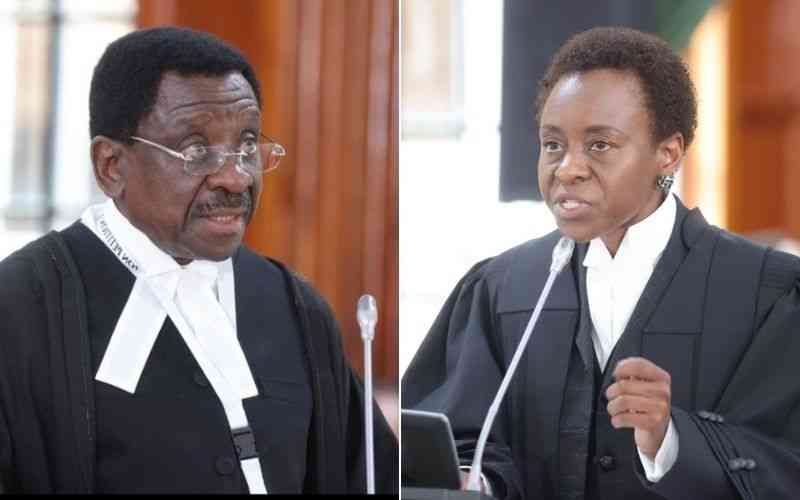Lawyers representing Raila Odinga in the Supreme Court presidential petition have argued that the August 9, 2022 presidential election was a product of craftiness by the IEBC and President-elect William Ruto.
James Orengo and Julie Soweto, who were the first to make their submissions at the apex court on Wednesday, said a vote manipulation scheme was hatched by the two respondents to ensure Ruto won the polls.
Citing affidavits by two people, Celestine Anyango Opiyo and Arnold Ochieng Oginga, Orengo and Soweto said there was evidence indicating that Odinga’s votes were reduced and added to Ruto’s in some polling stations.
This scheme, they said, was commonplace in the perceived strongholds of Ruto, especially in Bomet and Kiambu counties.
So elaborate and well-thought-out was the scheme, that the number of votes cast in the areas remained uninflated to avoid raising suspicion, said Orengo.
“There was a systematic deduction of votes from Raila Odinga and the same number of votes that were deducted, were added to William Ruto. However, the unique things about this scheme was that the total number of votes cast remained the same,” said Orengo.
The lawyer said the pattern was replicated in other areas, and has the potential of changing the election outcome if fully scrutinised.
Orengo said this was manifest in the results entered in forms 34A at the polling stations, which were different from those recorded in forms 34B.
Form 34A is used to record presidential results at the polling station level. Form 34B, on the other hand, is a collation of all the forms 34A, and recorded at the constituency tallying centre.
Form 34C is a collation of all forms 34B. It is recorded at the national tallying centre, and it’s what the IEBC chairperson uses to establish who has won the presidential election.
Orengo said the discrepancies that they noticed in forms 34A and 34B accounted for more than 140,000 votes.
“That (discrepancy) has an impact on the results of the election. I invite the court to look into the votes garnered by each of the presidential candidates; the figures do not agree at all.”
Orengo’s co-lawyer, Julie Soweto, in her submission said despite the forms 34A sharing features such as serial numbers, stamps and agents’ signatures, the results that the presidential candidates’ agents had, were different from those announced by IEBC chairperson Wafula Chebukati.
In some 15 polling stations, she said, the difference was 2,793 votes.
“Figures are important because of the slim margin [of votes] that William Ruto got to be declared the presidential election winner,” said Soweto.
“For example, in Chepalungu polling station 1 of 1 [in Bomet County], Ruto had 109 votes, yet in Form 34A uploaded to the IEBC portal, he had 169 votes. On the other hand, 60 votes were reduced from Raila Odinga.
“This was the pattern in all 41 polling stations that we have sampled and annexed to the affidavits,” said Soweto.
The lawyer also questioned why in several polling stations, especially those in Central Kenya and Rift Valley, more voters cast their ballots for the president than other elective seat candidates.
The IEBC had, in their replying affidavit, said stray votes, violence and postponed elections in eight areas resulted in higher votes cast for president than some other seats.
A stray ballot paper, according to the IEBC, refers to the ballot paper dropped in the wrong category, for instance a marked MCA ballot paper dropped in the governor’s ballot box.
Soweto said the argument that stray votes contributed to a higher number of votes for presidency than other elective seats wasn’t convincing.
“In Kirinyaga County, for example, there was an average of 33 stray ballot papers per polling station. That’s not possible [naturally],” she said.
“That high number of stray ballot papers cannot be explained, and has not been explained,” she emphasised.
Away from the alleged discrepancies in the electoral forms, and the highlighted stray ballot papers’ irregularities, Orengo and Soweto called for the nullification of the presidential results, saying the IEBC’s divisions were testament of a commission in turmoil, hence not able to preside over transparent elections.
"We have a commission that is divided right in the middle. That speaks to a dysfunctional constitutional body that is not capable of presiding over an election,” said Orengo.
The senior counsel argued that IEBC’s results transmission system was breached in favour of William Ruto.
"The way that the commission dealt with the forms during upload and doBy Stephanie Wangari , The Standard






